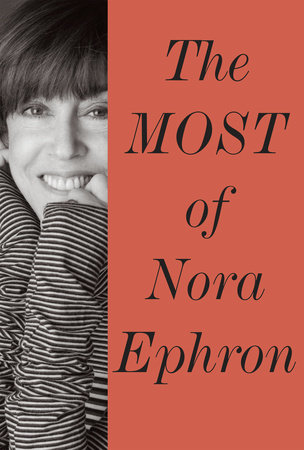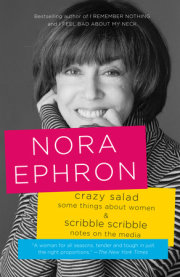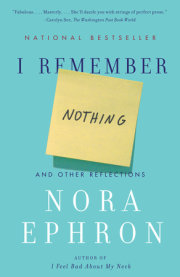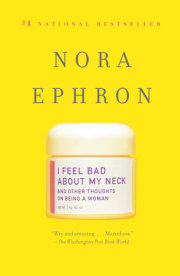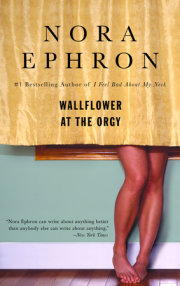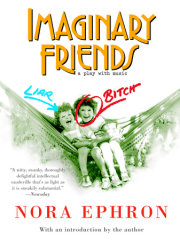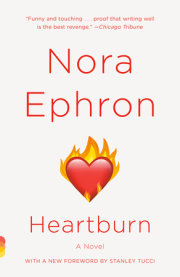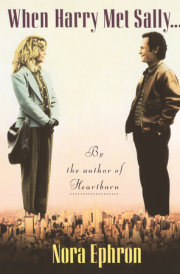Table of Contents Introduction by Robert Gottlieb
The JournalistIntroduction to Wallflower at the Orgy
Journalism: A Love Story
How to Write a Newsmagazine Cover Story
The Assassination Reporters
The Palm Beach Social Pictorial
The Boston Photographs
Russell Baker
The Detroit News
The Ontario Bulletin
Gentlemen’s Agreement
I Just Want to Say: The World Is Not Flat
The Making of Theodore H. White
The AdvocateVaginal Politics
Miami
Reunion
Commencement Address to Wellesley Class of 1996
The Profiler: Some WomenHelen Gurley Brown: “If You’re a Little Mouseburger, Come with Me . . .”
Dorothy Schiff and the New York Post
Dorothy Parker
Lillian Helman: Pentimento
Jan Morris: Conundrum
Pat Loud: No, But I Read the Book
Julie Nixon Eisenhower: The Littlest Nixon
Lisbeth Salander: The Girl Who Fixed the Umlaut
The NovelistHeartburn
The PlaywrightLucky Guy
The ScreenwriterWhen Harry Met Sally . . .
The FoodieSerial Monogamy: A Memoir
Baking Off
I Just Want to Say: The Egg-White Omelette
Gourmet Magazine
A Sandwich
I Just Want to Say: Teflon
The Food Establishment: Life in the Land of the Rising Soufflé (Or Is It the Rising Meringue?)
About Having People to Dinner
The BloggerThe First Annual “Tell Us What You’re Cooking This Year for Thanksgiving Dinner That You Didn’t Cook Last Year”
Hello. By the Way. Whatever.
Deep Throat and Me: Now It Can Be Told, and Not for the First Time Either
The Curious Incident of the Veep in the Summertime
Hooked on Anonymity
One Small Blog
On Bill Clinton
A Million Little Embellishments
Scooter, Rosa Lopez, and the Grassy Knoll
Reflections on Reading the Results of President Bush’s Annual Physical Examination
My Weekend in Vegas
O. J. Again
Say It Ain’t So, Rupe
Melancholy Babies
Take My Secretary of State, Please
On Being Named Person of the Year
Condi’s Diary
Some People
What Did You Do in the War?
How to Foil a Terrorist Plot in Seven Simple Steps
My Top Ten New Year’s Resolutions
Hooked on Hillary
White Men
It Ought to Be a Word
PersonalThe Story of My Life in 3,500 Words or Less
The Legend
Me and JFK: Now It Can Be Told
A Few Words About Breasts
The Mink Coat
Parenting in Three Stages
The D Word
Fantasies
On Maintenance
The Six Stages of E-mail
Considering the Alternative
On Rapture
Revision and Life: Take It from the Top—Again
I Feel Bad About My Neck
What I Wish I’d Known
I Hate My Purse
Christmas Dinner
I Remember Nothing
The O Word
What I Won’t Miss
What I Will Miss
Introduction by
Robert GottliebA couple of years before Nora’s death in 2012, she and I sat down to begin putting together the table of contents for this book. Then other things got in the way—her play, Lucky Guy; a movie script she was working on—and it was set aside. Perhaps, too, knowing how ill she was, she began to see the book as a memorial and that made her uncomfortable—she never said. But although I was aware of her dire medical situation, the original impulse behind the book was not to memorialize but to celebrate the richness of her work, the amazing arc of her career, and the place she had come to hold in the hearts of so many readers.
The reaction to her death was an outpouring of disbelief and grief. Before the publication of her two final collections—I Feel Bad About My Neck and I Remember Nothing—she was, of course, admired and enjoyed for both her writing and her movies, but the readership of these last books seemed to me to be on another level. It was personal. Her readers not only felt that they knew her but that she knew them. Obviously, not all the people—more than a million of them!—who bought Neck were women who identified with her or sensed her identification with them, but certainly many of them were. She had become a model, an ideal, or at the very least, an example—she was telling them things about herself that were also about them, and giving them permission to think these things and feel these things. And she was also telling them what to look out for, what lay ahead. Her honesty and directness, and her unerring prescience, had made her a figure—someone whose influence and authority transcended her individual achievements, extraordinary as they were.
In her later years, her movies brought her tremendous response and reward, both for their quality and because she was the first woman of her time to become a successful commercial film director. How did she do it? By her talent, naturally—her uncanny ability to give us romance as seen through a gimlet eye. Some people complained that her movies were sentimental—those happy endings! But those happy endings were actually realistic: She had lived one herself, through her long third marriage, one of the happiest marriages I’ve ever witnessed.
The determination and persistence—and clarity—that saw her prevail in Hollywood were the qualities that earlier had propelled her to the heights of journalism, first as a reporter, then as an outspoken com- mentator. Her abiding principle was the reality principle. And of course she had a not-so-secret weapon: She was funny, even when she was furious; funny through thick and (as we know from Heartburn) thin. And she was openly and generously personal without being egotistical. She saw everything wryly, including herself. She also looked great.
This book is structured around the many genres and subjects she explored and conquered. As you’ll see, it’s autobiographical, sociological, political. It adds up to a portrait of a writer, a log of a writer’s career, and an unofficial—and unintended—report on feminism in her time. She’s a reporter, a profilist, a polemicist, a novelist, a screenwriter, a playwright, a memoirist, and a (wicked) blogger—blogging came along just in time for her to lash out fiercely at the bad old days of Bush/ Cheney. And let’s not forget that she was an obsessed foodie. Even her novel has recipes.
What was she like in real life? To begin with, she was a perfect spouse: She and her Nick could have given lessons to that earlier exemplary Nick-and-Nora, the Thin Man and the Thin Man’s lady. She adored her two boys, and nobly tried not to micromanage them. (A real sacrifice: Managing things was one of her supreme talents—and pleasures.) She was a fanatical friend, always there for anyone who needed support, encouragement, or kindness. She was also, I can report, a wonderfully responsive colleague. We worked together on all her books after her first collection, Wallflower at the Orgy, without a single moment of contention. As a result, I think I know what she would have wanted this book to be, and her family allowed me to shape it. My immedi- ate reward was having a professional excuse to reread everything she ever wrote. No other editorial job I’ve ever performed has been so much fun.
A few notes on the text. Since almost all of this material has previ- ously appeared in print but in a variety of venues, we’ve justified such technical matters as spelling and punctuation. There are some places (surprisingly few, actually) where, over the years, Nora repeated certain stories (sometimes with minor variations) or remade certain points—as in her memories of her early role model, “Jane.” We’ve left these as they originally appeared so that they can be read in context. The brilliant introduction she wrote for the published version of When Harry Met Sally . . . originally preceded the text of the script, but now it fol- lows it—I felt it gave away too many of the surprises to come. The recipes—she might not have been pleased—remain untested.
—Robert Gottlieb
Copyright © 2013 by Nora Ephron. All rights reserved. No part of this excerpt may be reproduced or reprinted without permission in writing from the publisher.

